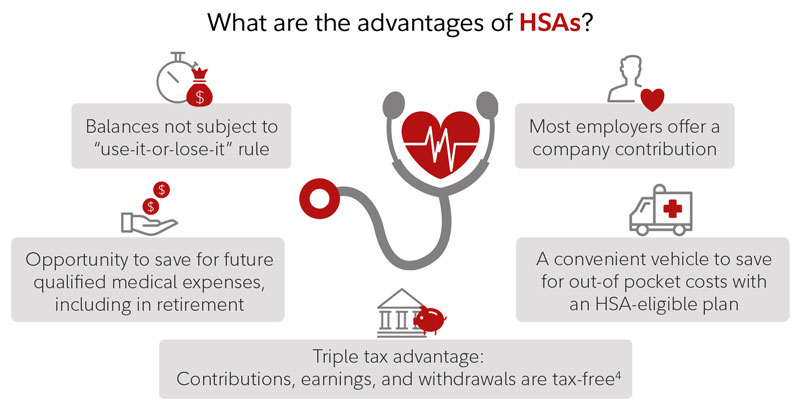Learn: Rules for Having a Health Savings Account (HSA)
Nov 22, 2023 By Triston Martin
Introduction
The Medicare Prescription Drug, Improvement, and Modernization Act introduced rules for having a Health Savings Account (HSA). These savings accounts are becoming increasingly popular with those who want to lower their medical bills. Additionally, they can be used as a tax-deductible savings instrument. The money you save in the HSA may be used to pay for eligible medical costs for you, your spouse, and any dependents. Almost any medical expense you might have is considered a qualifying expense.
Examples include the cost of prescribed preventative medications and diagnosing, treating, and mitigating diseases. Banks typically administer HSA accounts, but they can also be managed by brokers, insurance companies, and credit unions. You don't typically need a separate account with the bank, although you can open one there if you want to.
What is the Process of a Health Savings Account?
Contributions to the HSA will not be taxed. That implies that payroll deductions for contributions can be made from employers who offer plans. The rest of us can claim deductions when our yearly tax returns are filed, especially self-employed individuals. They are tax-free if money is returned from the HSA to cover eligible medical costs. It may be necessary to pay for dental, vision, and other costs that a regular medical insurance plan might not cover in this situation. Most HSAs provide a debit card that you can use to pay for prescription medicines and other qualified expenses.
If you're awaiting a bill in the mail, you can call the billing office and use your debit card to make a phone payment. By the end of the year, you will have enough money to cover future medical bills that qualify as such. End-of-year balances are carried forward for a certain amount of time. The money in the account is yours, and you can continue to own it even if you change employment, change your health insurance, or retire. The money grows tax-free in the account while it is there.
Advantages of HAS

The HSA's ability to be used to pay for expenses that qualify as deductions is one of its largest benefits. The HSA functions as a tax shelter, so you can avoid paying taxes on the money you deposit. This enables you to avoid the tax-deductible amount and use the funds for medical bills that you presumably already paid for with post-tax money. Be aware that you might use the account to cover expenses above what your primary health insurance covers.
For instance, HSA money could still be utilized for dental and vision bills even if your health plan does not cover these services. There are some things for which an HSA cannot be used as payment. It cannot be applied to the payment of insurance premiums. Along with the bulk of aesthetic operations, other non-eligible costs include toothpaste, toiletries, and cosmetics. Traveling to an area with a healthier environment is also not an option.
How Do I Create an HSA?
The process of signing up to become an HDHP begins with this. Your company's human resources department can help you set up your HSA if you do this through them. You can work with an HSA service provider that many businesses have. The account can be set up at your own cost. HSAs are offered by banks, brokerages, and credit unions. Each HSA service has the power to specify its terms. You may invest your contributions in bonds, equities, or funds with HSAs provided by a brokerage.
Typically, the banks that provide HSAs charge the highest interest rates. The enrollment process is simple after you've decided on a service. You must fill out an application and include details about your HDHP. You can fund the account and utilize the money for eligible costs once your application has been approved.

Investment Tools: HSAs
HSAs offer tax-free insurance. Additionally, they offer the chance to generate capital gains that can be used tax-free to cover medical bills. Naturally, the investment possibilities will become more significant as your HSA balance increases. Most HSA account owners would prefer to exercise caution while handling this money because they are intended for or is expected to be used for medical purposes. This can restrict the investments a holder can make with the money they receive from their HSA contributions to largely lower-risk securities like Treasuries, municipal bonds, or high-grade corporate bonds.
Conclusion
People with high-deductible health insurance policies can use the health savings account (HSA) to help offset their out-of-pocket costs. HSA contributions are not required to be tax-deductible on a federal level, and the account's earnings can increase tax-free. The money in an HSA that isn't spent is rolled over at year's end and is thus available for future medical expenses. You must sign up for high-deductible health insurance to qualify. High deductible health plans, which are required for HSAs, might not be the greatest option, especially for people who expect to have a lot of medical bills shortly.

Cost comparison: new vs. used car purchases

How Interest works on Savings Account

Decoding Bank Profits: Unveiling 5 Effective Sales Strategies

Ways to Reduce Medical Debt

Refinance Your Mortgage

Ways to Manage Currency Exchange in New York City

How the Bearish Engulfing Candle Pattern Signals a Market Shift

What Is Subordinated Debt And What Are the Possible Consequences?

Everything About Land Ownership: Freehold vs. Nonfreehold Estates
